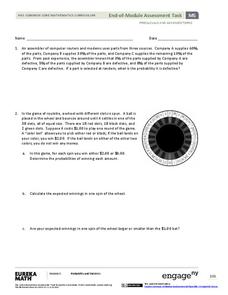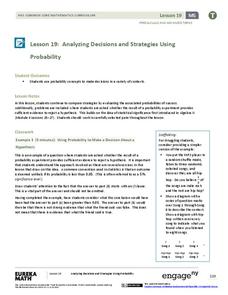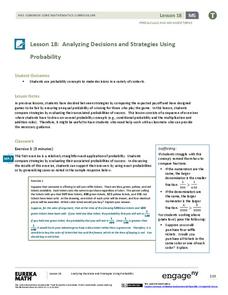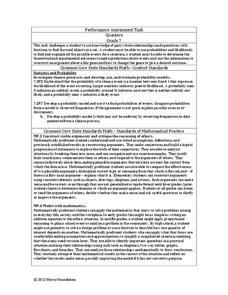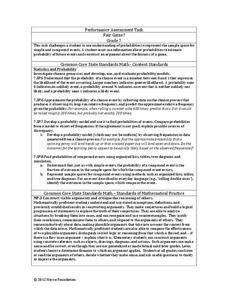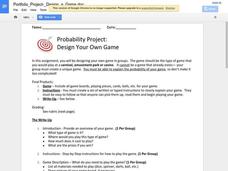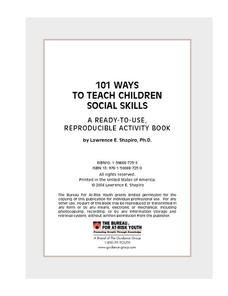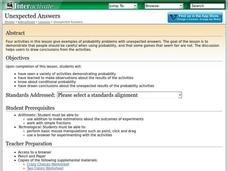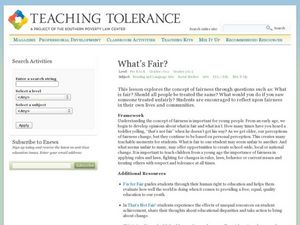EngageNY
End-of-Module Assessment Task - Precalculus (Module 5)
Give your young scholars a chance to show what they've learned from the module. The last installment of a 21-part series is an end-of-module assessment task. It covers basic and conditional probabilities, expected value, and analyzing...
EngageNY
Analyzing Decisions and Strategies Using Probability 2
Explore how to compare and analyze different strategies. In the 20th installment of a 21-part module, scholars continue their analysis of decisions and strategies from the previous instructional activity. They then extend this concept to...
EngageNY
Analyzing Decisions and Strategies Using Probability 1
Learn how to increase the probability of success. The 19th installment of a 21-part module teaches future mathematicians how to use probability to analyze decisions. They determine strategies to maximize the chances of a desired outcome.
EngageNY
Fair Games
What constitutes a fair game? Scholars learn about fair games and analyze some to see if they are fair. They extend this idea to warranties and other contexts.
EngageNY
Making Fair Decisions
Life's not fair, but decisions can be. The 17th installment of a 21-part module teaches learners about fair decisions. They use simulations to develop strategies to make fair decisions.
Noyce Foundation
Counters
For some, probability is a losing proposition. The assessment item requires an understanding of fraction operations, probability, and fair games. Pupils determine the fractional portions of an event. They continue to determine whether...
Noyce Foundation
Fair Game?
The game should be fair at all costs. The mini-assessment revolves around the ability to use probabilities to determine whether a game is fair. Individuals determine compound events to calculate simple probabilities and make long-run...
Music Publishers Association of the United States
I Made It. I Own It. Please Don't Steal It.
Explore the world of copyright law with a variety of activities to instill the importance of respecting creative property. Scholars watch an animated tale then take part in a grand conversation detailing the video's main idea, details,...
Google
Probability Project: Design Your Own Game
Designing a game is the focus of this probability lesson. Groups develop and build a unique game, including directions for how to play, a calculation of the expected value of winning, and a personal reflection. The plan provides a rubric...
August House
Go to Sleep, Gecko
Use this multidisciplinary lesson to delve into these subjects: English language arts, math, science, drama, and character education. After reading, discussing, and making interpretations about Go To Sleep, Gecko!: A Balinese Folktale by...
Positively Autism
"Share the Road" Folder/Shoebox Games
Introduce the importance of sharing and taking turns with your learners through a hands-on learning experience involving toy cars! Here you'll find activity instructions and printables to support your "Share the Road" collaborative...
Learning for Life
Trust Me - I Won't Let You Down
What is fairness? What does it mean to be trustworthy? Learners explore these concepts in an important life skills lesson, which includes reading a story, responding to sample scenarios, and classroom discussion.
National Security Agency
Are You Game? A Lesson Connecting Fractions and Probability
Exactly how fair are the board games children grow up playing? Young mathematicians investigate this questions as they work their way through this five-lesson series on basic probability.
Scholastic
Ruby Bridges: A Simple Act of Courage, Grades 3-5
Through character trait graphic organizers, a vocabulary sorting activity, class discussion, and a civil rights movement slide show, your young historians will be introduced to the amazing story of Ruby Bridges and her experiences as the...
Scholastic
Ruby Bridges: A Simple Act of Courage, Grades K-2
A civil rights movement lesson designed specifically with the Common Core State Standards in mind, young learners are introduced to the story of Ruby Bridges as the first African American child to attend an all-white elementary school....
Guidance Group
101 Ways to Teach Children Social Skills
Increasing pressure to improve student achievement has made it easy to overlook the social skills they also need to develop. With this collection of worksheets and activities, you'll be able to improve children's communication, teamwork,...
Critical Thinking Cooperative
Doing Our Share
Whether at home or in the classroom, each member of a community has certain responsibilities they must tend to. With the help of the children's story Piggybook by Anthony Browne, kids learn how to assign jobs in a fair and safe manner...
Curated OER
"Bursting" Stereotypes
Students comprehend the meaning of the word steretype, work in groups to come up with stereotype statements, discuss whether the statements are fair, and write what they learned from the activity. Balloons are used as a conduit in this...
Curated OER
The Whole Truth and Nothing But the Truth????
After listening to Jon Scieska’s The True Story of the 3 Little Pigs, groups discuss whether they think the wolf is telling the truth, whether he deserves punishment, and if so what punishment he deserves. You might use this activity...
Curated OER
Justice for All
A reading of Roald Dahl’s Lamb to the Slaughter opens a discussion of justice and fairness. Using a Venn diagram and an Idea Wheel graphic organizer, class members consider the similarities and differences in these two terms. They then...
Curated OER
Paper Clip Game for Learning the Value of Rules
Learners explore the components of good rules and their importance in society. Consistency and fair application for the maintenance of order is emphasized as paper clips and the rules of a game are manipulated.
Curated OER
Unexpected Answers
Students explore the concept of fairness. In this fairness lesson plan, students play four probability games. Students determine who has the best chance of winning each of the four games. Students discuss which games gave an unfair...
Curated OER
What's Fair?
Learners investigate the concept of fairness. In this fairness instructional activity, students discuss fairness and how different people view it in different ways. They read stories which deal with fair and unfair.
Curated OER
The Ugly Duckling: A Discussion of Human Rights
Students, after listening to The Ugly Duckling, by Hans Christian Anderson, become more aware of their relationship to human rights in regards to equality, justice, fairness, civil rights, and social justice.


